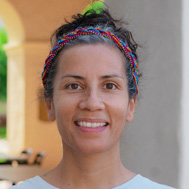
Online Spanglish Decolonial Healing Certificate
The Online Spanglish Decolonial Healing Certificate is a 12-unit program for Spanish and/or Spanglish speakers who want to learn about decolonization and healing. The program explores creative decolonial healing alternatives in Spanglish.
Who is this program for?
This program is for Spanish or Spanglish speaking students from any disciplinary background who are interested in decolonization and healing. Spanglish speakers include students who identify their linguistic identity among Pocho, Rancho, Tex-Mex, Ingleñol, Castellano, Español, Chicanx, Barrio, or any other equally legitimate diasporic borderland encounters between the two imperial languages, Spanish and English.
What will I learn?
In this program, you will learn about decoloniality from social and intellectual activists from Abya Yala (Latin America) and the Caribbean. You will also learn about Black, Indigenous, and Campesinxs movements; and Black and Chicanx movements in the U.S.
What will I do?
In this program, you will engage with decolonial content within your own disciplines and from an exploratory perspective. You will also develop creative transformative alternatives of healing situated in your particular socio-political contexts.
Why should I enroll?
This program is an opportunity to learn about decolonization and healing in a Spanglish context. You will also have the opportunity to develop creative transformative alternatives of healing that are situated in your particular socio-political contexts.
Key Features
- Language: The Certificate’s primary focus is to create linguistic spaces for discussions of the material in Spanish, English and Spanglish. The curriculum includes materials in English and Spanish (originally written in that language rather than translations from English). Courses are facilitated through any variations of code switching between Spanish and English and Spanglish.
- Online: The Certificate program is offered in an online format to facilitate accessibility of working students in any geo-location.
- Duration: The Certificate is designed to be completed in two semesters/one academic school year. A 3- and 4-semester option will be available for students choosing or needing additional time to complete the certificate in two years.
- Fall Start: The Certificate will start in the Fall semester of every academic school year.
- Cohort Model: Students stay with the same cohort during the completion of the program. However, this may vary slightly if a student chooses a 3 or 4 semester option.
- Schedule: Courses will include synchronist and asynchronist schedules to accommodate working students.
Coursework
Students in the certificate program must complete 12 units of formal course work and be awarded credit for all courses for work equivalent to a course letter grade of a 3.0 (B) grade point average.
3 & 4 Semester Options
The certificate could be completed full time (one year) or part time (two years).
Full time:
Fall: CSP 602 and CSP 603; Spring CSP 604 and CSP 605
Part time:
Fall First Year: CSP 602; Spring First Year: CSP 604; Fall Second Year: CSP 603; Spring Second Year: CSP 605.
Course Descriptions
- CSP 602: Knowledge justicia: Mental Health Care and The Decolonial Option
- CSP 603: Language Justicia, Spanglish and Mental Health
- CSP 604: The Coloniality of Gender, The Colonial Difference and Mental Illnesses
- CSP 605: Decolonizing the Temporality, Grammar and Aesthetics of Healing
Admission Requirements
Applications are considered once a year for admission the following fall.
- Bachelor's degree: from an accredited institution in any discipline with a 2.85 GPA in the last 60 units.
- Linguistic proficiency: demonstrate reading and oral proficiency in English and Spanish or Spanglish by passing the certificate's linguistic proficiency review.
Tuition Cost
Standard SDSU graduate fees:
- Up to 6 units per semester: $3,356
- Greater than 6 units per semester: $4,862
Students who are not California residents are charged an additional $396 per unit in nonresident tuition. For more information on fees, see SDSU Money Matters.
This certificate is not eligible for financial aid. You can sign up for SDSU's installment plan to make payments during the term. Or, you can apply for private, alternative loans to help pay your tuition.
 Contact Us
Contact Us
marcela polanco, Certificate Coordinator
[email protected]